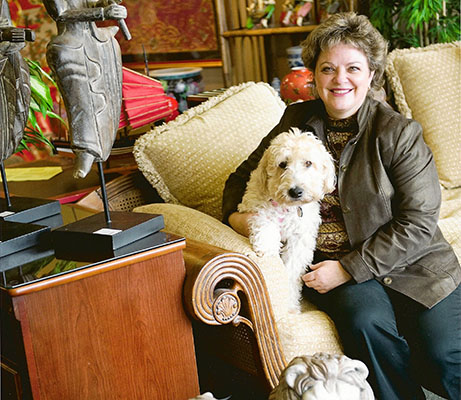
Kay Frandsen, founder and owner of The Wabi Sabi Shop, a fine home-furnishings consignment shop in Wayzata, explains what prompted her to open the store in September 2009. “A lot of people drift through life, looking for something [beyond] just a means of making money. As long as you’re working and contributing to society, it should be fulfilling as well.”
“The word ‘career’ comes from the Latin carrier, it carries you through life. If you want to carry yourself through life, do something that suits you, that you’re passionate about. I didn’t find this out until I was 50. All I knew was I was unhappy, I was suited for interior design, but didn’t find what fit me.”
That all changed when Frandsen lost her “final” job. That’s when she got serious about looking for something that would give her a spark – get her revved up. “When I came across the term wabi-sabi, which translates roughly to ‘humble beauty,’ a light went on – this made sense to me.” More than 11 years later, Frandsen can say she’s doing work that’s fulfilling.

That’s not to say the early going was easy. “For the first few years I didn’t get paid. When you start up a business, you’re the last one to make any money, you bide your time. I’d ask the bookkeeper if I could have $500 and she’d say, ‘Can you wait till next week?’ Finally, she said, ‘Kay, we can put you on the payroll.’”
People find the Wabi Sabi Shop through word of mouth, the shop’s website, an active Facebook page and weekly email blasts. “When we send an email blast Friday afternoon, within an hour we get calls. They’ll ask, ‘how much is that blue desk I saw?’ And they buy it over the phone.”
The website is updated regularly with photos and new items. When an item is sold, it comes off the website within 20 minutes. Items that don’t sell either get retrieved by their owners or donated.
“We have furniture that’s had one lifetime, and it is still good, worthy of more life, not ready for the junk heap. If a piece is out of style, just reupholster or paint it, and it can have a whole new life.”


The Wabi Sabi Shop enjoys a lot of repeat business from loyal consignors. “Once they’ve started doing business with us, we’re their go-to place. They know we’re going to take care of everything, they’ll get a decent price for their merchandise, and get a check in the mail or store credit.” Those choosing store credit get a bonus of 10 percent. “We’re thanking them for doing business with us. There are no hidden fees, everything is laid out, upfront. We give you nine weeks [on the sales floor]. We’re going to take all the headache away from what you would be doing trying to sell yourself. We’ve got a nice building; the showroom is like walking into Gabberts. We don’t buy anything, it’s a hundred percent consignment—and the money goes right back into the pockets of those in the community.”
The Wabi Sabi Shop is an upscale experience. Merchandise ranges from Pottery Barn to Ethan Allen, Thomasville, Baker, Henredon, and other good-quality brands. “I don’t take anything that’s in poor condition,” says Frandsen.
During COVID, people have been home, thinking, ‘I’ve got to redo this room or change out something.’ A lot of people can’t wait 12-14 weeks to order something. That’s because a lot of stores don’t have the inventory. But here they can take it with them.”
Frandsen remembers fondly opening the door of her shop for the first time. “It was so easy. It was like I had been doing this all along. I felt in control, never shooting from the hip, never winging it. I had thought through absolutely everything, I even researched what kind of a vacuum I needed to buy to keep the place clean, like a hotel. I’ve always felt good about the way I’ve run my business: honest, upfront, fair with people.”
The movement to waste less and live better encourages residents to buy used goods, repair their items, refuse unnecessary “extras,” and rent or borrow used gear rather than buying new – not only to reduce waste and preserve natural resources, but to save money. By pledging to waste less and live better, residents receive valuable waste reduction tips and regular email alerts about upcoming sales and events. Learn more and subscribe today.
The Wabi Sabi Shop
The Wabi Sabi Shop - Facebook
The Wabi Sabi Shop - YouTube
The Wabi Sabi Shop - Instagram
